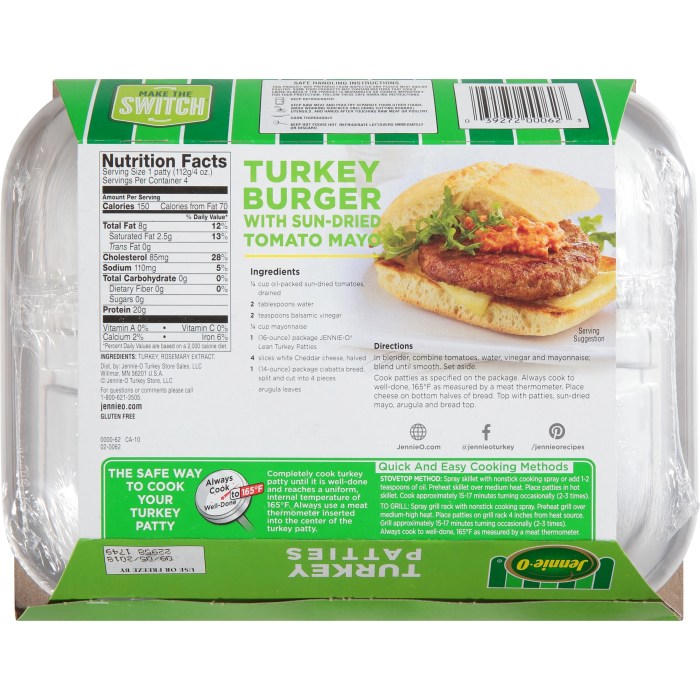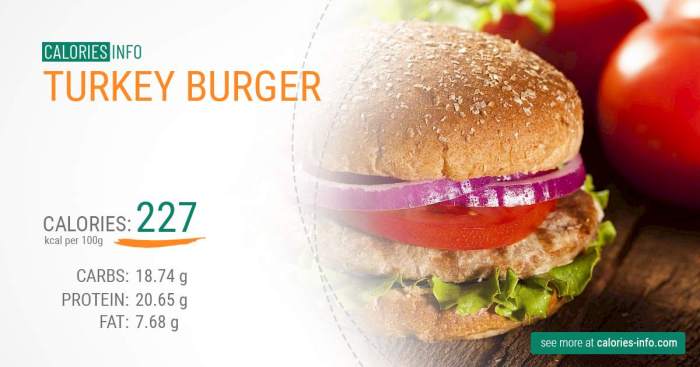Comparison with Other Burger Types

Turkey burger nutrition facts – Turkey burgers are frequently touted as a healthier alternative to other burger options, but a direct comparison reveals a more nuanced picture. Understanding the nutritional differences between turkey and other burger types, such as beef, chicken, and veggie burgers, is crucial for making informed dietary choices. This section will analyze the nutritional profiles of these various burger options, focusing on key aspects like saturated fat, cholesterol, and sodium content.Turkey burgers generally offer a leaner protein source compared to their beef counterparts.
However, the specific nutritional content can vary significantly depending on the type of turkey used (ground white meat versus ground dark meat), the added ingredients (such as fillers or seasonings), and the cooking method. Similarly, variations exist across different brands and preparations of beef, chicken, and veggie burgers.
Nutritional Differences Between Turkey and Beef Burgers
A typical 3-ounce beef burger often contains significantly more saturated fat and cholesterol than a similar-sized turkey burger. Beef is naturally higher in these components. For example, a beef burger might contain 8-10 grams of saturated fat and 70-90mg of cholesterol, while a turkey burger might contain 3-5 grams of saturated fat and 50-70mg of cholesterol. The sodium content can also vary, depending on the processing and seasonings used, but beef burgers frequently contain more sodium than turkey burgers.
It’s important to check the nutrition labels of specific brands for precise figures.
Nutritional Advantages and Disadvantages of Turkey Burgers
Choosing a turkey burger presents both advantages and disadvantages when compared to other options. While often lower in saturated fat and cholesterol than beef burgers, turkey burgers may not always be lower in sodium. Compared to chicken burgers, turkey burgers usually offer a similar lean protein source but may vary in fat content depending on the type of turkey used.
Turkey burgers are a leaner alternative to beef, offering a good source of protein and iron. However, a balanced diet is key, and considering the nutritional content of other foods is important for overall health. For example, understanding the nutritional profile of dairy, like what’s detailed in this helpful resource on 1 milk nutrition facts , can help you create a well-rounded meal plan.
Returning to turkey burgers, remember to consider portion size and added toppings to manage your overall calorie and fat intake.
Veggie burgers, on the other hand, provide a completely different nutritional profile, often being lower in fat and cholesterol but potentially higher in sodium and carbohydrates, depending on the ingredients.
Pros and Cons of Turkey Burgers Compared to Beef Burgers, Turkey burger nutrition facts
The following points highlight the key nutritional differences:
- Pros of Turkey Burgers: Generally lower in saturated fat and cholesterol; often a good source of lean protein.
- Cons of Turkey Burgers: Can be higher in sodium than some beef burger options; nutritional value can vary greatly depending on the type of turkey and added ingredients; may be less flavorful than beef burgers for some palates.
- Pros of Beef Burgers: Can be a good source of iron and other essential nutrients; often richer in flavor.
- Cons of Beef Burgers: Typically higher in saturated fat and cholesterol; can be higher in sodium.
Impact of Preparation Methods: Turkey Burger Nutrition Facts

The cooking method significantly impacts the nutritional profile of a turkey burger. Different techniques affect fat content, calorie count, and the overall nutritional value, influenced further by added ingredients. Understanding these changes allows for informed choices to maximize nutritional benefits.
Grilling, pan-frying, and baking each present unique advantages and disadvantages regarding nutrient retention and fat addition. Grilling, for instance, often leads to some fat dripping away, potentially reducing the overall calorie and fat content. Pan-frying, however, can increase the fat content depending on the type and amount of oil used. Baking, on the other hand, tends to be a lower-fat option, though it might result in a slightly drier burger.
Fat Content and Calorie Changes Across Cooking Methods
The cooking method significantly influences the final fat and calorie content of a turkey burger. Grilling allows excess fat to drip off, generally resulting in a lower fat and calorie count compared to pan-frying. Pan-frying, particularly with added oil, substantially increases both fat and calorie content. Baking, without added fats, offers a relatively lower-fat and calorie option. However, the specific values depend on the type of turkey burger, its initial fat content, and the amount of oil used in pan-frying.
For example, a lean 4oz turkey burger patty, grilled without added oil, might contain approximately 150 calories and 5g of fat. The same patty pan-fried in 1 tablespoon of olive oil could easily exceed 200 calories and 10g of fat. Baked, it might remain closer to the grilled version’s calorie and fat content.
Influence of Added Ingredients
Adding cheese, sauces, and toppings dramatically alters the nutritional profile of a turkey burger. Cheese, particularly high-fat varieties like cheddar or pepper jack, significantly increases the calorie and fat content. Sauces, such as mayonnaise or creamy dressings, contribute substantially to the fat and calorie count, as well as sodium levels. Toppings like bacon, avocado, or extra cheese further amplify the calorie and fat intake.
Conversely, lighter toppings like lettuce, tomato, and onion have a minimal impact on the nutritional values. For example, adding a slice of cheddar cheese might add an extra 100 calories and 8g of fat, while a tablespoon of mayonnaise adds approximately 100 calories and 11g of fat.
Nutritional Impact Comparison Table
| Cooking Method | Approximate Calories (per 4oz patty) | Approximate Fat (grams, per 4oz patty) | Notes |
|---|---|---|---|
| Grilling (no added oil) | 150-180 | 5-8 | Fat drips away during cooking. |
| Pan-frying (1 tbsp oil) | 200-250 | 10-15 | Oil significantly increases fat and calories. |
| Baking | 160-190 | 6-9 | Generally lower in fat than pan-frying. |
FAQ Resource
Are turkey burgers always healthier than beef burgers?
Not necessarily. While turkey burgers often have less saturated fat and cholesterol, the nutritional content depends heavily on the type of turkey used (dark meat vs. breast), cooking method, and added ingredients. A turkey burger with lots of cheese and sauce can easily surpass a lean beef burger in calories and fat.
How can I reduce the sodium content in my turkey burger?
Avoid using pre-seasoned turkey patties or heavily salted sauces. Season your turkey burger yourself using herbs, spices, and low-sodium condiments. Choose low-sodium cheese and buns.
Are turkey burgers a good source of iron?
Yes, especially those made with dark meat turkey, which is a better source of iron than breast meat. However, the bioavailability of iron can be affected by other dietary factors.
Can I freeze turkey burgers?
Yes, you can freeze uncooked turkey burgers for later use. Wrap them tightly in freezer-safe wrap or place them in a freezer bag to prevent freezer burn.
